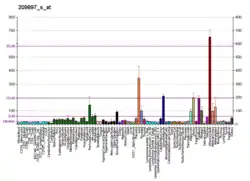SLIT2
Slit homolog 2 protein is a protein that in humans is encoded by the SLIT2 gene.[5][6][7]
Interactions
SLIT2 has been shown to interact with Glypican 1.[8]
References
- GRCh38: Ensembl release 89: ENSG00000145147 - Ensembl, May 2017
- GRCm38: Ensembl release 89: ENSMUSG00000031558 - Ensembl, May 2017
- "Human PubMed Reference:". National Center for Biotechnology Information, U.S. National Library of Medicine.
- "Mouse PubMed Reference:". National Center for Biotechnology Information, U.S. National Library of Medicine.
- Itoh A; Miyabayashi T; Ohno M; Sakano S (February 1999). "Cloning and expressions of three mammalian homologues of Drosophila slit suggest possible roles for Slit in the formation and maintenance of the nervous system". Brain Res Mol Brain Res. 62 (2): 175–86. doi:10.1016/S0169-328X(98)00224-1. PMID 9813312.
- Chedotal A (February 2008). "Slits and their receptors". Adv Exp Med Biol. Advances in Experimental Medicine and Biology. 621: 65–80. doi:10.1007/978-0-387-76715-4_5. ISBN 978-0-387-76714-7. PMID 18269211.
- "Entrez Gene: SLIT2 slit homolog 2 (Drosophila)".
- Ronca, F; Andersen J S; Paech V; Margolis R U (August 2001). "Characterization of Slit protein interactions with glypican-1". J. Biol. Chem. United States. 276 (31): 29141–7. doi:10.1074/jbc.M100240200. ISSN 0021-9258. PMID 11375980.
Further reading
- Wong K; Park HT; Wu JY; Rao Y (2003). "Slit proteins: molecular guidance cues for cells ranging from neurons to leukocytes". Curr. Opin. Genet. Dev. 12 (5): 583–91. doi:10.1016/S0959-437X(02)00343-X. PMID 12200164.
- Zhao XC; Zhang LM; Li Q; Tong DY; Fan LC; An P; Wu XY; Chen WM; Zhao P; Wang J. (2013). "Isoflurane post-conditioning protects primary cultures of cortical neurons against oxygen and glucose deprivation injury via upregulation of Slit2/Robo1". Brain Res. 1537: 283–9. doi:10.1016/j.brainres.2013.08.036. PMC 3820100. PMID 23994690.
- Wang KH, Brose K, Arnott D, et al. (1999). "Biochemical purification of a mammalian slit protein as a positive regulator of sensory axon elongation and branching". Cell. 96 (6): 771–84. doi:10.1016/S0092-8674(00)80588-7. PMID 10102266. S2CID 16810644.
- Brose K, Bland KS, Wang KH, et al. (1999). "Slit proteins bind Robo receptors and have an evolutionarily conserved role in repulsive axon guidance". Cell. 96 (6): 795–806. doi:10.1016/S0092-8674(00)80590-5. PMID 10102268. S2CID 16301178.
- Li HS, Chen JH, Wu W, et al. (1999). "Vertebrate slit, a secreted ligand for the transmembrane protein roundabout, is a repellent for olfactory bulb axons". Cell. 96 (6): 807–18. doi:10.1016/S0092-8674(00)80591-7. PMID 10102269.
- Nguyen Ba-Charvet KT, Brose K, Marillat V, et al. (1999). "Slit2-Mediated chemorepulsion and collapse of developing forebrain axons". Neuron. 22 (3): 463–73. doi:10.1016/S0896-6273(00)80702-3. PMID 10197527. S2CID 18663762.
- Holmes GP, Negus K, Burridge L, et al. (1999). "Distinct but overlapping expression patterns of two vertebrate slit homologs implies functional roles in CNS development and organogenesis". Mech. Dev. 79 (1–2): 57–72. doi:10.1016/S0925-4773(98)00174-9. PMID 10349621. S2CID 6057216.
- Liang Y, Annan RS, Carr SA, et al. (1999). "Mammalian homologues of the Drosophila slit protein are ligands of the heparan sulfate proteoglycan glypican-1 in brain". J. Biol. Chem. 274 (25): 17885–92. doi:10.1074/jbc.274.25.17885. PMID 10364234.
- Wu W, Wong K, Chen J, et al. (1999). "Directional guidance of neuronal migration in the olfactory system by the protein Slit". Nature. 400 (6742): 331–6. Bibcode:1999Natur.400..331W. doi:10.1038/22477. PMC 2041931. PMID 10432110.
- Georgas K, Burridge L, Smith K, et al. (2000). "Assignment of the human slit homologue SLIT2 to human chromosome band 4p15.2". Cytogenet. Cell Genet. 86 (3–4): 246–7. doi:10.1159/000015351. PMID 10575218. S2CID 6028258.
- Niclou SP; Jia L; Raper JA (2000). "Slit2 is a repellent for retinal ganglion cell axons". J. Neurosci. 20 (13): 4962–74. doi:10.1523/JNEUROSCI.20-13-04962.2000. PMC 6772294. PMID 10864954.
- Zou Y; Stoeckli E; Chen H; Tessier-Lavigne M (2000). "Squeezing axons out of the gray matter: a role for slit and semaphorin proteins from midline and ventral spinal cord" (PDF). Cell. 102 (3): 363–75. doi:10.1016/S0092-8674(00)00041-6. PMID 10975526. S2CID 14174593.
- Chen JH, Wen L, Dupuis S, et al. (2001). "The N-terminal leucine-rich regions in Slit are sufficient to repel olfactory bulb axons and subventricular zone neurons". J. Neurosci. 21 (5): 1548–56. doi:10.1523/JNEUROSCI.21-05-01548.2001. PMC 6762944. PMID 11222645.
- Stein E; Tessier-Lavigne M (2001). "Hierarchical organization of guidance receptors: silencing of netrin attraction by slit through a Robo/DCC receptor complex". Science. 291 (5510): 1928–38. Bibcode:2001Sci...291.1928S. doi:10.1126/science.1058445. PMID 11239147. S2CID 24626940.
- Wu JY, Feng L, Park HT, et al. (2001). "The neuronal repellent Slit inhibits leukocyte chemotaxis induced by chemotactic factors". Nature. 410 (6831): 948–52. doi:10.1038/35073616. PMC 2072862. PMID 11309622.
- Ronca F; Andersen JS; Paech V; Margolis RU (2001). "Characterization of Slit protein interactions with glypican-1". J. Biol. Chem. 276 (31): 29141–7. doi:10.1074/jbc.M100240200. PMID 11375980.
- Nguyen Ba-Charvet KT, Brose K, Ma L, et al. (2001). "Diversity and specificity of actions of Slit2 proteolytic fragments in axon guidance". J. Neurosci. 21 (12): 4281–9. doi:10.1523/JNEUROSCI.21-12-04281.2001. PMC 6762758. PMID 11404413.
- Little M, Rumballe B, Georgas K, et al. (2003). "Conserved modularity and potential for alternate splicing in mouse and human Slit genes". Int. J. Dev. Biol. 46 (4): 385–91. PMID 12141424.
- Dallol A, Da Silva NF, Viacava P, et al. (2002). "SLIT2, a human homologue of the Drosophila Slit2 gene, has tumor suppressor activity and is frequently inactivated in lung and breast cancers". Cancer Res. 62 (20): 5874–80. PMID 12384551.
This article is issued from Wikipedia. The text is licensed under Creative Commons - Attribution - Sharealike. Additional terms may apply for the media files.





